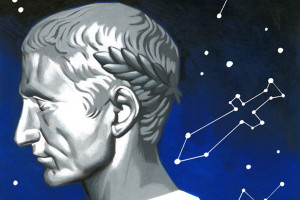WSJ Historically Speaking: Beware of Astrologers on the March
According to the Roman historian Suetonius, an unnamed soothsayer repeatedly tried to warn Julius Caesar that calamity awaited him, famously saying, “Beware the Ides of March.” But March 15 arrived without anything untoward taking place, and Caesar bumped into the soothsayer as he made his way to the Curia Pompeii. “See,” chided Caesar, “the day has come.” “Yes,” came the reply. “But it has not yet gone.”
If the story is true, the soothsayer is one of the few astrologers in history to make a completely clear and unambiguously accurate prediction. But the abysmal record of astrology and its intellectual cohorts doesn’t seem to have dented their popularity. Looking to the stars for guidance is as ancient as the Babylonians, who used astrological charts to help predict the recurrence of the seasons. Every ancient civilization from the Egyptians to the Persians studied the stars, seeing astronomy and astrology as variations of the same pursuit.
In the fourth century B.C., Alexander the Great’s conquests spread the popularity of astrology throughout the Hellenistic world. Rome proved especially fertile ground after Julius Caesar’s supposed brush with the soothsayer. Officialdom disapproved of astrologers, and so did the poet Juvenal, who complained early in the second century of “people who cannot appear in public, dine or bathe, without having first consulted an ephemeris.”
Constantine, Rome’s first Christian emperor, made astrology punishable by death. But in following centuries, the Catholic Church maintained an uneasy truce with the practice, with some popes routinely consulting their astrologers before making any important decisions. Nearly every royal court employed an official astrologer, though none was as famous as the French apothecary known as Nostradamus, who (when not writing vague prognostications about the future) was employed by France’s queen, Catherine de Medici, to make horoscopes for her children.
The practice was still at the heart of daily life in 1606 when William Shakespeare voiced his skepticism in “King Lear,” warning “that, when we are sick in fortune—often the surfeit of our own behavior—we make guilty of our disasters the sun, the moon, and the stars.”
A hundred years later, however, astrology met its match in the form of Isaac Bickerstaff, Esq. The leading astrologer of the day was John Partridge, whose annual predictions in his almanac “Merlinus Liberatus” had been terrifying Londoners since 1684. In 1708, Bickerstaff published a rival set of predictions, which included Partridge’s death “upon the 29th of March next, about eleven at night, of a raging fever.” On March 30, notices of Partridge’s demise were sent around London. Church officials arrived at Partridge’s home to take the body away—only to find that he was very much alive.
By this time, Londoners had grown tired of Partridge’s gloomy tyranny, and many decided that they preferred him dead. People who had been tormented by him in the past took particular pleasure in perpetuating the fiction of his demise. The more Partridge protested that he was healthy, the more ridiculous he appeared. His power to awe and terrify was broken. Years later, the perpetrator of the hoax was revealed to be Jonathan Swift, the author of “Gulliver’s Travels.”
Despite Swift’s efforts, there has never been a shortage of believers in astrology, including Nancy Reagan and Princess Diana—just as there has never been a shortage of scientists trying to debunk it. In 1979, two U.S. astronomers named Robert Culver andPhilip Ianna published the results of a study examining more than 3,000 predictions by leading astrologers between 1974 and 1979. Their research revealed that 2,673 turned out to be plain wrong—a failure rate of almost 90%. Scientific predictions have their problems too. When researchers at the U.S. Geological Survey analyzed 2,300 earthquake forecasts from more than 230 sources, they found that they were less accurate than simply guessing. As Cassius in Shakespeare’s “Julius Caesar” says, “The fault, dear Brutus, is not in our stars.”

